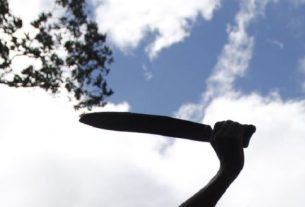The mobile phone footage is shaky, but undeniable. A slender teenager sits in the harsh fluorescent glare of a police station in the Paris suburbs.
Towering above him is a municipal police officer in a dark blue uniform, his bulky frame accentuated by a bulletproof vest.
The officer taunts and intimidates the boy, grabs him by the collar, jerks him violently to one side of the bench and hits him hard across the head.
He is only 14 years old.
While shocking, it is not the worst of the abuse this minor suffered last year on March 17.
The police officer, identified as Cédric G, had allegedly urinated on him and one of his two 16-year-old friends earlier that night, after detaining the trio for breaching curfew rules in force during the coronavirus pandemic.
Also present on the scene was local police chief Yohan C, who allegedly told one of the 16-year-olds: “Since there are trees and you are Black, you could climb onto the trees.”
Media investigation
The case, recently exposed by French news site Mediapart, is the latest in a long line of police abuses which have come to light in France in recent times, often targeting Black and Arab men, demonstrating what rights groups term systemic brutality and racism in its security forces.
Despite being sacked by the municipality of Saint-Ouen last year in July, both Cédric G and Yohan C subsequently found municipal jobs elsewhere in the Paris region.
And, while Cédric G – still operating as a police officer – faces prosecution at Bobigny court on December 15, his former boss appears to be off the hook.
“Police officers know they are protected,” said Omer Mas Capitolin, a founder of the Community House for Supportive Development, one of six NGOs that last year raised a class action against the French government for systemic discrimination by police officers carrying out identification checks.
“These sorts of cases are widespread. Often people don’t speak out because it’s too humiliating,” he told Al Jazeera. “But those boys were lucky.”
As it turned out, the brother of one of the victims, an anti-crime agent with the national police force, immediately complained to the municipal authorities. But it was still their word against that of the sworn police officers.
Long litany of denials
Faced with a long litany of denials that any violence had occurred, supported by a bland police report on the supposedly routine ID checks carried out on the night, the case might have collapsed had the crucial video evidence not come to light.
But even though the falsehoods and cover-ups have since been exposed, justice is far from being done.
According to Mediapart, investigators were denied security camera footage from the location where the boys were detained and reportedly handcuffed and beaten, with the control centre claiming the footage had already been erased.
The mobile phone footage from the station, taken by an officer identified as David L, subsequently came to light.
Faced with irrefutable proof of his abusive behaviour, Cédric G dismissed his actions as a couple of “slaps”, claiming that the 14-year-old had insulted him.
According to testimony by three police officers, Yohan C seemed to express “pride” when shown the video evidence.
The municipality acted on the evidence, and both officers were sacked in short order. But despite their repeated acts of bad faith, it did not see fit to take claims that Cédric G had urinated on the boys any further.
The officer had claimed to be suffering from a prostate problem, having simply “pinched his sex” to alleviate the need to urinate, a claim backed up by Yohan C and the five other officers present on the scene, whose testimonies had otherwise proven unreliable, to say the least.
Despite his supposed condition, Cédric G failed to come up with medical certificates to back his testimony.
Tests on items of clothing provided by one of the victims as evidence had come up negative, a spokesperson for the municipality told Al Jazeera.
“Factually, the urination wasn’t proven by the inquiry. It’s difficult if there’s no proof. That’s why we recognised an intention to humiliate in the inquiry, but … no urine.”
The town’s Socialist Party mayor Karim Bouamrane, elected in 2020, is trying to create an “ethical police force, focused on prevention, rather than repression”, he said. “It’s a project that is close to his heart.”
‘Indecent exposure’
The municipality is supporting the victims at the upcoming hearing and reportedly covering their legal fees.
But, following the municipality’s lead, prosecutors at Bobigny court have also shied away from investigating claims that Cédric G urinated on victims.
While the officer is being tried for “indecent exposure” and “deliberate violence by a person in a position of public authority”, he will be spared any further scrutiny on the most serious charge of all.
Kathleen Taieb, the lawyer representing the 14-year-old, has accused the court of habitually failing to show solidarity with victims of police violence.
“The word of the police officer is always stronger than the victim,” says Mas Capitolin. “The French government does everything to deny the systemic nature of the problem. Black and Arab youth are targeted on a daily basis. They are not considered fully fledged French citizens. There is a political will to stigmatise an entire segment of the population.”
Abdoulaye Kanté, author of Policier, enfant de la République, a book detailing his long career as a Black police officer, facing down discrimination from colleagues and accusations of betrayal from his community, said the authorities are still “catching up” when it comes to tackling racism.
“It is completely unacceptable,” he told Al Jazeera. “The day you put on your uniform, you are in the service of citizens. It is our job to serve citizens. If there are colleagues who abuse, they must be denounced. If they are not denounced, we become complicit.”
“We have to be relentless on racist behaviour,” he said. “Tough measures need to be taken.”__Al Jazeera





